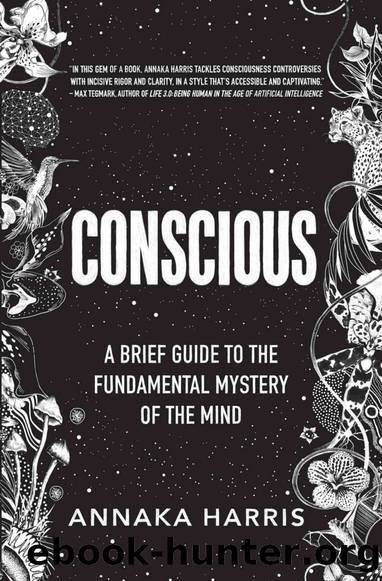Conscious: A Brief Guide to the Fundamental Mystery of the Mind by Annaka Harris

Author:Annaka Harris [Harris, Annaka]
Language: eng
Format: epub
ISBN: 9780062906731
Google: n6JrDwAAQBAJ
Amazon: 0062906712
Barnesnoble: 0062906712
Goodreads: 41571759
Publisher: HarperCollins
Published: 2019-05-06T00:00:00+00:00
Christof Koch is one neuroscientist who is willing to consider the panpsychic interpretation, telling an interviewer:
If you take a more conceptual approach to consciousness, the evidence suggests there are many more systems that have consciousnessâpossibly all animals, all unicellular bacteria, and at some level maybe even individual cells that have an autonomous existence. We might be surrounded by consciousness everywhere and find it in places where we donât expect it because our intuition says weâll only see it in people and maybe monkeys and also dogs and cats. But we know our intuition is fallible, which is why we need science to tell us what the actual state of the universe is.15
I follow him here wholeheartedly, but he then goes on to say things like, âWe know that most organs in your body do not give rise to consciousness. Your liver, for example, is very complicated, but it doesnât seem to have any feelings.â16 If one can imagine that a worm has some level of consciousness (and that it would maintain its consciousness while residing in a human body), whether itâs contributing to the scope of consciousness that âIâ am experiencing right now is irrelevant to the question of whether the worm is experiencing something. So these separate lines of investigation (what contributes to âmyâ consciousness versus what is conscious) end up confusing the larger question about what consciousness is in the first place and where in the universe we will find it.
By entertaining the notion that bacteria or individual cells could have some level of consciousness, Koch seems open to a modern version of panpsychism, yet in the same conversation he asserts that the cerebellum, with its sixty-nine billion neurons, âdoes not give rise to consciousness.â But just because the cerebellum is not responsible for the part of my brain that governs language or for the flow of consciousness that I consider to be âme,â we can still wonder whether itâs another region (or regions) of consciousness, just as we can speculate that a worm or a bacterium might be conscious. Although Koch is here addressing consciousness in two different contextsâconsidering a panpsychic view in one instance, and pointing to specific processes in the body that arenât included in the typical experience of consciousness in the otherâthe overall thinking on this subject in neuroscience and philosophy tends to be inconsistent; or at the very least, a piece of the conversation is often missing.
And even though, as mentioned earlier, Thomas Nagelâs definition of the word âconsciousnessâ (i.e., being like something) is the most accurate way to talk about subjective experience, there are a variety of ways people use the word (the capacity for self-reflection, wakefulness, alertness, etc.), which causes additional confusion. But we can continue to pose questions about whether consciousness exists outside systems that can report back about itâwe just have to do so on another level of conversation. When I am unconscious during a period of deep sleep, for instance, all we know is that the part of
Download
This site does not store any files on its server. We only index and link to content provided by other sites. Please contact the content providers to delete copyright contents if any and email us, we'll remove relevant links or contents immediately.
| Acupuncture & Acupressure | Aromatherapy |
| Ayurveda | Chelation |
| Chinese Medicine | Energy Healing |
| Healing | Herbal Remedies |
| Holistic | Homeopathy |
| Hypnotherapy | Massage |
| Meditation | Naturopathy |
| Reference |
Inner Engineering: A Yogi's Guide to Joy by Sadhguru(6785)
The Power of Now: A Guide to Spiritual Enlightenment by Eckhart Tolle(5744)
Fear by Osho(4727)
Ikigai by Héctor García & Francesc Miralles(4236)
The Art of Happiness by The Dalai Lama(4120)
The Ultimate Bodybuilding Cookbook by Kendall Lou Schmidt(3927)
Yoga Therapy by Mark Stephens(3741)
The Little Book of Hygge by Meik Wiking(3677)
The Healing Self by Deepak Chopra(3568)
Why Buddhism is True by Robert Wright(3446)
The Hatha Yoga Pradipika (Translated) by Svatmarama(3315)
Being Aware of Being Aware by Rupert Spira(3272)
Shift into Freedom by Loch Kelly(3192)
Wild Words from Wild Women by Stephens Autumn(3137)
Work Clean by Dan Charnas(3113)
Happiness by Matthieu Ricard(3039)
More Language of Letting Go: 366 New Daily Meditations by Melody Beattie(3017)
Yoga Body & Mind Handbook by Jasmine Tarkeshi(2870)
Why I Am Not a Feminist by Jessa Crispin(2744)
